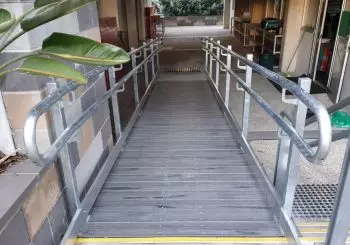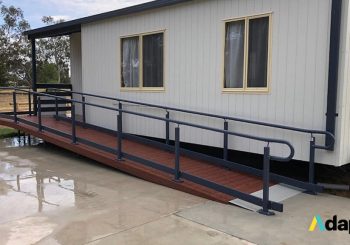As a banking or financial institution, you need to ensure that you have DDA compliant wheelchair ramps installed on your property for employees and customers that need them
As a banking or financial institution, you need to ensure that you have DDA compliant wheelchair ramps installed on your property for employees and customers that need them. Today, all public and government and almost all commercial buildings have these ramps, at strategic entry and exit points of the property.
In addition to the stairs that lead up to the entrance, it is mandatory for wheelchair ramps to be installed. You need to ensure that the indoor areas of your multi-storied commercial or financial building have operational lifts, elevators, and escalators. Similarly, you are also required to ensure that wheelchair ramps are installed at appropriate locations on your premises.
People with disabilities can find it extremely challenging to enter the premises of financial institutions and banks to conduct regular transactions. Not only can this be an inconvenience for them, but it can also mean that you are discriminating against these individuals.
Why Your Financial Institution Needs Wheelchair Ramps
It’s true that we live in an era of Internet banking and many people now choose to conduct most of their financial transactions online. However, it’s also a fact that, sometimes, people have to go to the physical location of their bank or financial institution to carry out certain transactions. Many elderly people are not very tech savvy and prefer to go to their bank on a regular basis.
There could be times when some individuals have appointments with banking and financial professionals and need to have a face to face conversation with them. If these people are wheelchair-bound or use any other mobility device, it’s important they have access to the bank or financial institution without having to worry about whether there would be a ramp present.
This is why it becomes important for financial institutions to focus on their responsibilities regarding access to people with disabilities. If your banking or financial institution doesn’t have the right type of wheelchair ramps, it can be a clear case of discrimination. In fact, you can also face the legal action from access advocates and the public alike if you fail to meet your responsibility on this account.
But just having a wheelchair ramp isn’t enough. You also need to make sure that it’s structured as per the DDA guidelines. There needs to be sufficient space for people that use wheelchairs or other mobility devices to manoeuvre around very easily, without having to struggle or become exhausted while doing so.
The Legal Aspect
Not only are you morally bound to ensure that people with disabilities are able to access your premises easily, but it’s the law as well. As per Section 23 of the D.D.A., individuals need to have non-discriminatory access to any premises which the public/ section of the public is allowed or entitled to use. In this context, the term premises is defined as a building, structure, vessel, vehicle, aircraft or any place (whether enclosed/built on/not built on).
Government service offices, medical facilities and hospitals, sports venues, cinemas, shops, educational institutions, and many other establishments are covered under this act. Similarly, financial institutions and banks are also legally bound to provide ramp access to their clients and employees, under this Act.
Making the Right Ramp Choice
As a credible and well-established banking institution or establishment, it is important you focus on ensuring that your employees, customers, and clients aren’t inconvenienced in any way while accessing your services. Today, there are a number of different types of ramps to choose from. Since every building is different and every access point is unique, it’s important to choose your ramp installations wisely.
We can provide you with all the information you need about the type of ramps available, helping you make a better-informed decision about the features you need. If you want to know more about official guidelines for access, don’t hesitate to get in touch with us at Adapta. You can call 1800 232 782 or contact us through this form.



